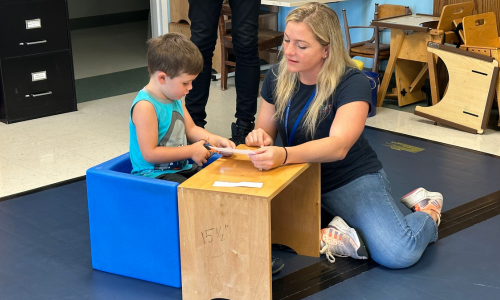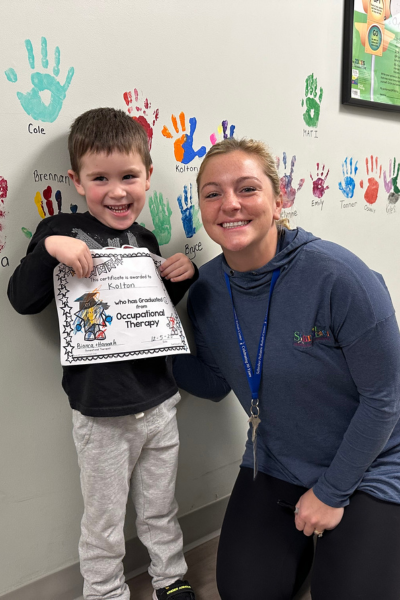Tag: impulse control
Kolton Conquers Sensory Struggles and Graduates Occupational Therapy Victorious
December 18, 2023At three years old, Kolton was having difficulty within a variety of areas including attention, transitions, emotional regulation, sensory processing, using feeding utensils, and pencil grip. His mom Sam, a behavioral consultant who had a professional history with the Schreiber Center for Pediatric Development, brought him to the center for assessment. “I wanted to be sure that if there was something more we could be doing to help him struggle less, we were doing it.” Sam shares.
During his assessment, it was discovered that Kolton’s visual motor skills were in the average range. However, his fine motor skills were below average impacting his pencil and feeding utensils grasp. He was also demonstrating sensory processing differences, with a mixture of both sensory seeking and sensory sensitivity resulting in deficits in body awareness, impulse control, auditory sensitivities, and oral sensory seeking actions. Because of this, it was recommended that he begin occupational therapy sessions with Bianca to work on improving these skills.

During OT treatment, it was determined that Kolton had retained reflexes requiring reflex integration therapy. Reflex integration is the process through which primitive reflexes that are present in infants gradually diminish and are replaced by more controlled, purposeful movements as a child’s central nervous system matures. Kolton’s retained reflexes impacted his body awareness, bilateral coordination, fine motor, and his hand-eye coordination.
When Kolton began therapy, he had a very strong ‘infantile’ grip on writing and drawing utensils, and while he could write his own name, he had almost no interest in writing or doing any sort of arts and crafts. Bianca began working with him right away on learning how to hold his markers and crayons in a tripod hold with the correct amount of pressure when tracing images and coloring in between the lines. “It was especially helpful that Bianca played to his interests of trucks, trains, and other vehicles when coming up with new therapy games and crafts to do because it kept him engaged and made him want to do the work.” says mom, Sam. Now Kolton is a pro at the tripod hold and loves showing off what he works on in preschool every day. He doesn’t even mind practicing his fine motor skills at home anymore. Kolton also generalized his fine motor skill development to holding/using feeding utensils like a fork and spoon with an appropriate grip to self-feed during mealtimes. Kolton competed against Bianca picking up cheerios with a fork in sessions to improve this skill.

During their therapy sessions, Bianca noticed that Kolton was seeking heavy work and movement to help him process his sensory integration and began working those techniques into his therapy plan. To work on his hand-eye coordination skills and improve his bilateral coordination, Bianca worked with Kolton on midline crossing activities such as jumping jacks and cross crawls. These exercises helped Kolton learn how to move both sides of his body at the same time and allowed him to practice those skills while getting to move around. Since these activities don’t require any additional equipment, they were also perfect to practice with his parents at home.
Kolton also took his sensory work home with him to practice, and mom Sam proudly shared that he has improved with sitting still so well that “We recently took Kolton to his first movie in the theater, and he was able to stay in the theater without getting up and moving around for the entire movie.” She explained that he had never even done that at home; so for his first successful movie experience to have been in a theater was especially thrilling. Not only that, but the struggle over his daily routines has greatly diminished, and he has even recently started to brush his teeth on his own. Sam attributes these successes to the sensory work he’s been doing in OT with Bianca.
According to Sam, one of the biggest benefits to Kolton’s therapy journey at the Schreiber Center though is that he is slowly moving towards more independence. She shares her pride in the fact that he has even learned how to be an advocate for himself and tell those around him when he needs help, and even more importantly how they can best help him. His mom attributes this to the absolute perfect fit that Bianca was for him. Looking back, she remembered that he used to be a shy kid, hiding behind her until he was comfortable, but he took to Bianca almost instantly and by his second session wasn’t even turning back to wave bye to her as he walked into the OT gym. “This self-confidence has spilled over to preschool where he now goes three times a week with no struggle” mom boasts.

At Kolton’s October assessment session to determine if he would require additional therapy, Bianca told mom “We’re still working on strengthening midline crossing, but he’s succeeded in all his other goals. We’re recommending one more care of treatment plan for an additional 13 weeks, but he will likely be ready to graduate in 6.” Now just nine months after beginning OT services with Bianca, Kolton has graduated. Watching him get his handprint on our walls at graduation was a bittersweet moment for everyone involved. Of course, we want all our kiddos to improve to the point that therapy is no longer needed, but we always miss them and hope that they’ll come back to visit even after their last appointment is complete.
Reflecting on Kolton’s therapy journey, Sam shares something that got her through the tough times was remembering that nothing gets better without putting in the work. Pediatric therapy is a journey filled with ups and downs, but the kids and parents who put in the work agree, the payoff is immense. Sam recommends to all parents who are thinking about pediatric therapies for their children “Do it! It is better to do the assessment and know for sure whether your child needs the extra help that pediatric therapy can provide to them, than to not know and wonder if there is something else you could be doing to help them. There is no need to struggle though when the assessment is simple, and the process of therapy at Schreiber is so fantastic. There is no shame in asking for and accepting help.”

Help Schreiber Clients like Kolton receive the care they need, consider donating in support of our Kids’ Care Fund, a long and short term savings account used to cover the costs of uncompensated care.
As a nationally recognized pediatric facility, the Schreiber Center for Pediatric Development provides family-centered education and therapy programs for infants, children and adolescents with disabilities, developmental delays, and acquired injuries. Our goal-oriented approach maximizes each child’s ability to function independently within the community.